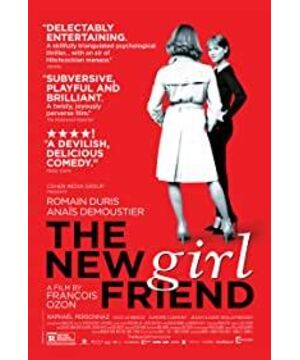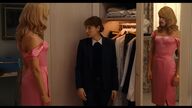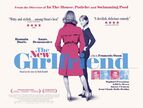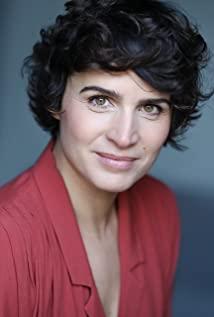The infinite possibilities of perceptual identity and the complexity of sexual desires are the "standardized response" of a queer audience after watching a film like "New Girlfriend". This emotional reaction suspends the effort of thinking and indulges the self in the political fantasy of emancipation with "infinite possibilities". In contrast, a psychoanalytic interpretation insists that desire has its structure. What really produces emotional tension is not the unrestricted and tedious self-proliferation of desire, but the inherent impossibility. We not only need to pay attention to what is flowing, but we should also ask: Why is such a kind of flow possible? In this sense, the fascination and failure of "New Girlfriend" may all stem from the entangled relationship between it and the desire framework outlined by Lacan's formula.
To understand this, we first need to go back to the original adaptation of Ou Jong's film-Ruth Lundell's short story "The New Girlfriend", in which the hero and heroine maintain an emotional relationship similar to the plot of the movie, but they are directed towards harmony. The ending of the movie is completely opposite. In the novel, Claire (for the sake of convenience, the names and the movies are unified) shows a kind of weird "misogyny"-being alone with any male will make her feel scared and uncomfortable. So that she has to carry a paper knife with her to prepare for self-defense. But precisely because of this, Claire naturally fell in love with David, who had become a woman in disguise, because he did not have the masculine atmosphere that bore her. The problem, however, is that David in the novel only regards cross-dressing as a hobby, and he is very sure that he is a male. Therefore, at the end of the story, Claire and David went to the hotel for a date. When David showed up in front of her in a male dressing gown after taking a shower, she could not hide her disappointment. "There are limits to everything. I don't really want to be a woman, I only do it sometimes for fun. Don't you know that?" David said, pushing Claire down on the bed and kissing. The trembling Claire struggled to withdraw the knife from her handbag, and plunged it into David's heart from her back time and time again, and the novel came to an abrupt end in the splash of blood.
This terrifying, even slightly surreal, ending in the original novel should obviously not be understood only as an unfortunate encounter between special individuals, but as a tension between two different universal structural positions. Direct expression-In Lacan’s formula, David represents an absolute male subject, “he is completely defined by Phallus”; while Claire represents an absolute female subject, “she is not at all taken by Phallus. definition". As an unreferential signifier, Phallus' definition of male does not depend on any specific masculine traits. On the one hand, as we have seen in David’s example, even if he eliminates all male characteristics through cross-dressing—in Claire’s words, “looks more like women than I and Laura”—Dai Wei still fully believes in his male identity. On the other hand, Claire never tells us exactly what she fears about men. Her fear is manifested as a kind of hysteria resisting any attempt to interpret, thus marking her completely out of the symbolic order. There is no possibility of complementarity between the absolute male subject position and the absolute female subject position, but a strictly opposite relationship. In this sense, the violent interruption of the sexual relationship between the two at the end of the novel is not a concrete realization of Lacan’s "no sexual relationship"?
From novels to movies, we can find a unique interactive relationship between the two texts of "New Girlfriend". Ou Rong’s adaptation does not merely complicate the original storyline, nor is it a new start after a complete subversion. On the contrary, the film is a logical complement to the novel: if the setting of the male and female protagonists in the novel represents the Lacan formula The absolute subject position of, then the character setting in the movie represents the relative subject position. Simply put, the plot development of the movie "New Girlfriend" is driven by two questions. The question on Claire's side is "Do I like men or women?" This question represents Lacan's second definition of the subjective position of women: "She cannot but be defined by Phallus." The film alternately explores two possibilities for this: we have both seen how Claire’s obsession with "Virginia" has been rationalized by the usual techniques of "popular psychoanalysis" (the flashback of childhood friendship undoubtedly implies that Claire was repressed afterwards. The homosexual emotions of Claire and her husband Jill (this sex scene is unimaginable in the original novel, because the novel specifically tells the reader that Jill doesn’t know that although Claire is married to him) For ten years, she was actually afraid of close contact with him, "that she was afraid of what he did and always had been"). The question on David’s side is "Am I a male or a female?" This question represents the second definition of the male subject position: "He is not completely defined by Phallus." David is also in the two answers Swaying between, he sometimes regards dressing as a hobby, like the protagonist in a novel, and sometimes regards female gender as his true nature.
It is also obvious that although the film packages the solution of these two questions as a "journey of self-discovery", it meaningfully takes the opposite route. On Claire’s side, we see that the absolute subject position of women is the end of her self-exploration-Claire in the movie eventually became Claire in the novel. She also chose women as the object of desire and rejected men ("Sorry I do "No" "Why?" "Because you are a man", this passage directly illustrates this point); and on David's side, we see that the absolute subject position of men is the starting point for his self-exploration-at the beginning When Claire found out, David explained transgender as a hobby of his own like the protagonist in the novel, and throughout the subsequent film David struggled to get rid of this structural position, until the end of his text message to Claire said When "No, I am a woman", he has completely become the opposite of David in the novel.
Unfortunately, David's last text message became a turning point in the quality of the entire movie. Before this text message, the tension of the sexual relationship expressed in the original novel was still diffused in the exploration process of the two movie protagonists' desires for themselves, and the audience could easily perceive that their respective struggles were not enough to overcome the intimate relationship between the two. A hidden impossibility in Claire and David-this is fully demonstrated in the last two consecutive failed sexual relations between Claire and David: for the first time in the training hall, David approached Claire as a male and was rejected; At the hotel the second time, David approached Claire as a woman and was still refused. It seems that the movie here is bound to move towards the same ending as the novel-gender difference as a kind of meta-difference, always lay between the two subjects and hinder the complete realization of any sexual relationship. However, Ou Jong's banal "political correctness" stance this time obviously forced him to refuse to accept this ending. "No, I am a woman", the subtext of this declaration is: "If you like a woman, then I am a woman." What we are facing here is a typical Lacanian perversion: in order to achieve a complete sexual relationship, the subject would rather desubject itself and reduce itself to an object for the enjoyment of others. In this sense, David's text message is nothing more than the director's desperate fantasy of trying to bridge the gender impasse, disguised as the hero's thorough discovery of the "authenticity of self". "New Girlfriend" thus loses the director’s usual sharp edge and the courage to subversively discuss sex and desire, and can only be used in the bridge segment of "awakening the vegetative" and "they live happily together after many years". Fall back into conventional wisdom.
View more about The New Girlfriend reviews











